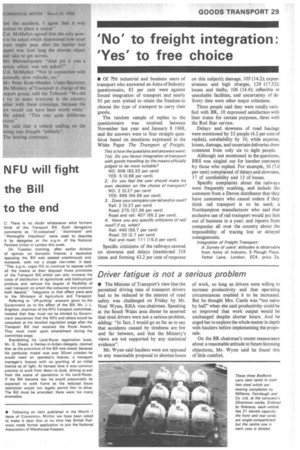' No' to freight integration: 'Yes' to free choice
Page 31

If you've noticed an error in this article please click here to report it so we can fix it.
• Of 136 industrial and business users of transport who answered an Aims of Industry questionnaire, 83 per cent were against forced integration of transport and neatly 95 per cent wished to retain the freedom to choose the type of transport to carry their goods.
The random sample of replies to the questionnaire was received between November last year and January 8 1968, and the answers were to four straight questions based on intentions expressed in the White Paper The Transport of Freight.
This is how the questions and answers went; 1(a). Do you favour integration of transport with goods travelling by the means officially judged to be most suitable?
NO: 606 (83.33 per cent) YES: 5 (0.68 per cent).
2. Do you feel the user should make his own decision on the choice of transport? NO: 2 (0.27 per cent) YES: 696 (94.56 per cent).
3. Does your company use rail and/or road? Rail: 2 (0.27 per cent) Road: 275 (37.36 per cent)
Road and rail: 407 (55.2 per cent).
4. Have you any specific criticisms of rail/ road? if so, what?
Rail: 440 (59,7 per cent) Road: 20 (2.7 per cent) Rail and road: 111 (15.0 per cent).
Specific criticisms of the railways centred on slowness and delays (mentioned 318 times and forming 43.2 per cent of response on this subject); damage, 105 (14.2); expensiveness and high charges, 129 (17.52); losses and thefts, 106 (14.4); inflexible or unsuitable facilities, and uncertainty of delivery date were other major criticisms.
Three people said they were totally satisfied with BR, 10 expressed satisfaction with liner trains for certain purposes, three with the Red Star service.
Delays and slowness of road haulage were mentioned by 32 people (4.2 per cent of replies), unreliability by 10, while expense, losses, damage, and uncertain deliveries drew comment from only six to eight people.
Although not mentioned in the questions, BRS was singled out for harsher comment by those who replied. For example, 56 (7.6 per cent) complained of delays and slowness. 17 of unreliability and 13 of losses.
Specific complaints about the railways were frequently scathing, and include the, comment from a Devon distributor that they have customers who cancel orders if they think rail transport is to be used; a Northampton manufacturer who said that exclusive use of rail transport would put him out of business in a year; and reports from companies all over the country about the impossibility of tracing lost or delayed consignments.
Integration of Freight Transport:
A Survey of users' attitudes is obtainable from Aims a Industry, 5 Plough Place, Fetter Lane, London, EC4, price 2s.












































































































